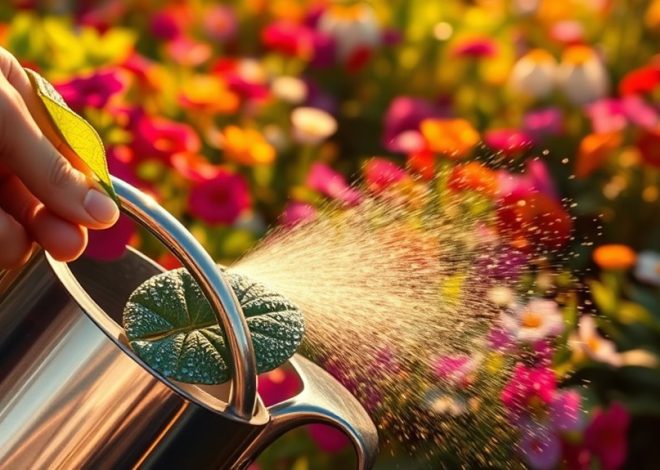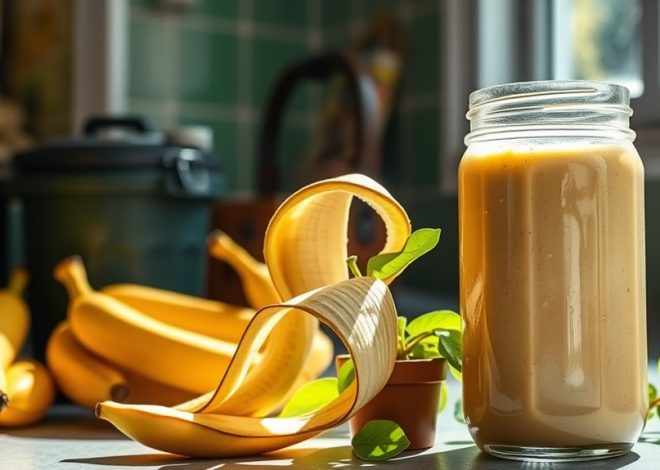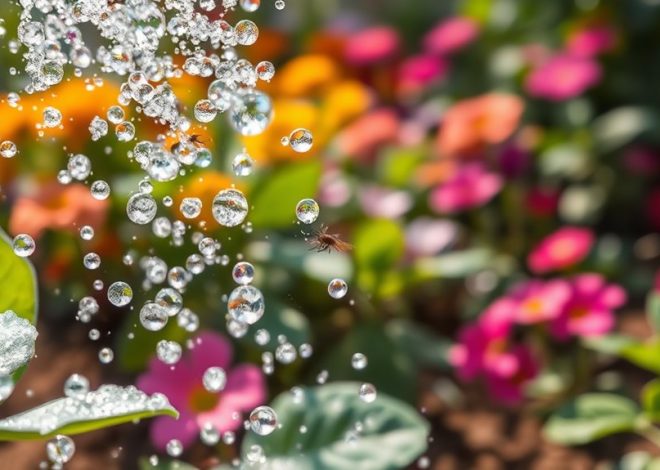
This Natural Ingredient Keeps Aphids Off My Plants
This Natural Ingredient Keeps Aphids Off My Plants
Imagine your lush garden, vibrant and full of life, suddenly invaded by tiny pests that sap the energy from your plants. Aphids can wreak havoc, causing significant harm if left unchecked. Luckily, you’ve got options that are both effective and environmentally friendly. One natural ingredient stands out for its ability to repel these pests. Understanding how to harness its power could transform your plant care routine and ensure your garden thrives.
Key Takeaways
- Garlic is an effective natural ingredient that repels aphids without using harsh chemicals.
- Neem oil disrupts aphid feeding and reproduction, forming a protective barrier on plants.
- Natural repellents promote robust plant growth while reducing chemical residues that harm beneficial insects.
- A mixture of water, dish soap, and vegetable oil can be sprayed to deter aphids.
- Regular application and monitoring are essential to maintain a pest-free environment and control aphid populations.
Understanding Aphids and Their Impact on Plants
Have you ever wondered how such tiny insects can wreak havoc on your garden? Aphids, small sap-sucking pests, can damage your plants significantly by draining their nutrients.
Their feeding activities lead to stunted growth, curled leaves, and even plant death.
Additionally, aphids excrete a sticky substance called honeydew, which attracts other pests and promotes fungal growth.
Understanding their behavior is crucial for effective aphid control naturally. Using natural repellents can be a safe and effective approach to protect your plants from these pests.
You can encourage beneficial insects like ladybugs or use organic insecticidal soaps to manage their populations.
The Benefits of Using Natural Ingredients
Natural ingredients offer a powerful and eco-friendly approach to managing aphid infestations in your garden.
By choosing natural methods, you reduce the risk of chemical residues that can harm beneficial insects and pollinators.
These ingredients often enhance soil health, promoting robust plant growth, which makes your plants more resilient against pests.
Additionally, they tend to be cost-effective and readily available, allowing you to maintain a sustainable gardening practice.
You’ll also find that natural solutions often have fewer side effects on the environment, ensuring your garden remains a safe haven for wildlife while effectively controlling aphid populations. Furthermore, using organic gardening practices helps promote environmental sustainability, which benefits both your garden and the planet.
The Key Natural Ingredient That Repels Aphids
One key natural ingredient that effectively repels aphids is neem oil, derived from the seeds of the neem tree. This oil contains azadirachtin, a compound that disrupts the feeding and reproductive activities of aphids.
When you apply neem oil to your plants, it forms a protective barrier, deterring these pests. Additionally, its properties can reduce aphid populations over time, making it a sustainable choice for gardeners. Neem oil is also one of the natural pest sprays that can be easily made at home, promoting a healthier garden without harsh chemicals.
Neem oil is safe for beneficial insects when used correctly, allowing you to maintain a healthy ecosystem. By incorporating neem oil into your pest management strategy, you can protect your plants from aphid infestations efficiently.
How to Prepare the Natural Repellent
To prepare an effective natural repellent for aphids, you’ll need specific essential ingredients that enhance its potency. Follow precise mixing instructions to ensure the ingredients combine effectively, maximizing their repellent properties. Additionally, understanding application techniques will help you target aphid infestations more efficiently. Using homemade sprays, such as garlic pest spray, can provide a safer alternative to chemical pesticides while effectively deterring pests.
Essential Ingredients Needed
Creating an effective natural repellent for aphids requires specific ingredients that harness the power of nature.
Start with neem oil, known for its insecticidal properties, which disrupts aphid reproduction.
Combine that with a few drops of liquid soap, which helps the oil adhere to plant surfaces.
Additionally, consider using garlic or cayenne pepper, both of which deter aphids with their potent scents.
Finally, distilled water serves as a base to mix these ingredients effectively.
Mixing Instructions
After gathering the necessary ingredients, you can begin mixing your natural repellent for aphids.
Follow these precise steps to create an effective solution:
-
1 cup of water – Use distilled or tap water.
-
2 tablespoons of dish soap – Choose a mild, biodegradable soap for safety.
-
1 tablespoon of vegetable oil – Any cooking oil will enhance the mixture’s stickiness.
-
Optional: 1 teaspoon of crushed garlic – This adds an extra layer of deterrent.
Combine these ingredients in a spray bottle, shaking well until fully blended.
Your natural repellent is now ready for application on your plants.
Application Techniques
How can you effectively apply your natural repellent to combat aphids?
Begin by filling a spray bottle with your prepared mixture. Ensure it’s well-shaken to disperse the active ingredients evenly.
Target the undersides of leaves, as this is where aphids often reside.
Apply the repellent in the early morning or late afternoon to avoid direct sunlight, which can diminish its effectiveness.
Repeat the application every week or after rainfall, as natural repellents may wash away.
Monitor your plants closely for aphid activity, adjusting your application frequency based on the infestation level to maintain optimal protection.
Application Techniques for Maximum Effectiveness
To maximize the effectiveness of your natural aphid repellent, pay close attention to dilution ratios, as they directly impact potency.
Timing your applications is equally crucial, ensuring you target aphids when they’re most vulnerable.
Additionally, focusing your efforts on infested areas will enhance your results and minimize damage to surrounding plants. Using a DIY soap spray can also help in effectively managing these pests while being safe for your garden.
Dilution Ratios Matter
Understanding the right dilution ratios is crucial for effectively combating aphids with natural ingredients.
A precise mix ensures maximum potency without harming your plants.
Here are some recommended ratios:
- 1:1 – Ideal for heavy infestations; use a potent mix to tackle severe aphid problems.
- 1:3 – Effective for moderate infestations; balances strength with plant safety.
- 1:5 – A gentle approach for preventative measures; maintains plant health while deterring aphids.
- 1:10 – Use this for light infestations; a diluted solution can help maintain a healthy garden ecosystem.
Choose wisely to protect your plants and keep aphids at bay.
Timing Your Applications
When’s the best time to apply natural treatments for aphids? Timing is crucial for effectiveness.
Ideally, you should apply treatments during early morning or late afternoon when temperatures are cooler and beneficial insects are less active.
This minimizes evaporation and maximizes absorption.
Additionally, if you notice aphid populations rising, act promptly; early intervention can prevent larger infestations.
Regular applications every 5 to 7 days may be necessary in peak season.
Always check the weather forecast; avoid applying before heavy rain, as it can wash away your treatment.
Targeting Infested Areas
Targeting infested areas effectively requires a strategic approach to application techniques.
Focus on these key methods to maximize your efforts:
- Identify hotspots: Look for clusters of aphids on leaves and stems.
- Concentrated application: Directly spray the natural ingredient on infested spots to ensure thorough coverage.
- Repeat regularly: Reapply every few days to disrupt the aphid lifecycle.
- Monitor results: Keep an eye on plant health and aphid population to adjust your strategy as needed.
Additional Tips for Maintaining Plant Health
Although aphids can pose a significant threat to your plants, maintaining overall plant health is crucial for preventing infestations and ensuring robust growth.
Start by ensuring your plants receive adequate sunlight, as poor light can weaken them.
Regularly check soil moisture levels; overwatering can lead to root rot, while underwatering stresses your plants.
Use organic fertilizers to provide essential nutrients and encourage strong growth.
Additionally, practice crop rotation and companion planting to enhance biodiversity, making your garden less attractive to pests. Companion planting can also help improve the flavor and growth of your herbs.
Finally, prune dead or diseased leaves promptly, which helps improve air circulation and minimizes the risk of disease.



